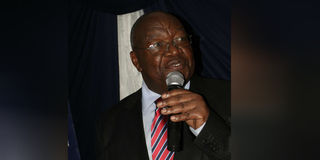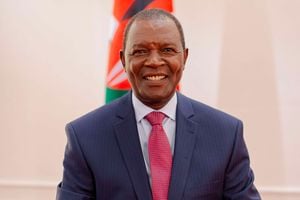Henry Chakava: The chairman who dined with the rich and poor

Henry Chakava speaks at a function in Nairobi on October 19 2010. He died on March 8, 2024.
The year was 2000. I had just engaged in a literary wrestling match with Barrack Muluka, the then managing director of East African Educational Publishers (EAEP); a tussle that had generated interest in literary circles.
Barrack had got intrigued by my audacity to challenge him. He decided to have a chat with me, perhaps to assess the depth of my intellectual rigour. A chat we did have, and a laugh too, which culminated in him offering me a job as an editor at EAEP. I have been 'headhunted'! I silently prided myself.
But there was another chat I needed to have before I could get the formal offer letter. A chat with the chairman.
An appointment was set, and I got to meet the chairman. Henry Chakava. I was ushered into his decent corner office in Westlands, and offered a comfy chair. Then the torture began. Whereas Barrack's mien and facial expressions were quite warm and welcoming, the Chairman wore a rather stern and serious look, reminiscent of headmasters of the yesteryear.
He gave me a long look, stood up and firmly shook my hand. The 'chat' turned out to be a one-hour formal interview, starting with the rather cryptic question: 'Tell me about yourself', through to 'What do you know about publishing?' and culminating in 'What value do you intend to bring on board if I hired you?'
Chairman would listen keenly, then meticulously jot down all the responses I gave. He would then look at me, ostensibly expecting more, and I would continue to mumble what I thought were incoherent responses. I would later come to realise that he was very particular about taking comprehensive notes during meetings. He would then ensure that the notes were filed for future reference.
To say that I felt intimidated and disconcerted would be an understatement. I didn't have any background in publishing. I had not anticipated such an incisive interview. I knew I had flopped. The moment the chairman gave his final verdict: 'We shall get back to you', I humbly hobbled out of his office, certain that my dream of working at EAEP had been shattered.
Two days later, I got a call from Barrack. He simply told me: The chairman was impressed. And that opened my doors at EAEP, the company I have served for the last 23 years and counting. Barely a week after joining, the chairman strolled into my office and asked what plans I had for lunch.
I had none. He invited me for lunch. But I was still apprehensive, imagining that he would seize the lunch hour to launch into yet another in-depth interview. But this turned out to be the opportunity for the real chat. We talked about literature, authors, publishing, family and all. He was chatty and witty in an amiable manner.
As days went by, I got to understand that this was vintage Henry, or simply HC. A chairman who had no qualms having a meal or even a drink with an intern. A deeply reflective leader who believed in getting into the inner sanctum of his staff, to understand what makes them tick. A leader who was never ensconced in the privacy of his state-of-the-art office.
Whereas one would have expected him to spend much of his time dissecting and discussing the financial statements of the company, he was equally at home discussing a raw manuscript with a rookie editor. He believed in the value of unsolicited manuscripts, and always reminded us that it was from such that some of the finest works of art could emerge.
One interesting fact that many people are surprised to learn is that even during his twilight years, and amidst failing health, HC always found time to read manuscripts and produce a reader’s report, which is publishing parlance for a manuscript assessment report. One of the books for which he did such a report a few months ago, a report which he discussed with the author and helped him to improve upon his manuscript, will soon be launched by EAEP.
HC did not train robotic staff whose stock-in-trade was to regurgitate mundane social rhetoric, he moulded and mentored critical thinkers. Many editors who have learnt publishing at the feet of this guru are still in awe of the famous HC-era Editorial and Production Board meetings. Having defended my Master's thesis a few years earlier, I equated these meetings to the rigorous defence of postgraduate thesis.
They were serious sessions that called upon editorial staff to present and defend the works they were handling. The sales and marketing team would tear into the 'defence'; the finance team would cast doubt at the 'return-on-investment' aspect of the work, hence giving the warehouse team a chance to unleash the knockout punch of 'avoiding non-moving products'.
Just when the editor was about to feel completely shattered, HC would step in. He had all along been listening keenly as the various teams authoritatively gave their opinions, and he would smile wryly, give precedents, moderate the discussion, and eventually salvage the besieged editor and his project.
But there were also moments when an editor would feel excited that he had managed to defend his project, and HC would step in and unleash the killer punch with only one question. There would be pin-drop silence in the boardroom. All would wonder why they had not thought about that angle of the matter.
The editor would then be asked to go back to the drawing board. Little wonder then that EAEP has always been identified with some of the finest works of art. Indeed, there was a year that EAEP scooped all the literary prizes in the Jomo Kenyatta Prize for Literature, cutting across all the categories – children’s literature, young adult literature and adult literature.
During such memorable feats, HC would personally fete the editor and the winning authors, sometimes inviting them for fine-dining at his house. More often than not, the publisher-author relationship turned into personal friendship.
Some of the authors who ended up being his bosom buddies are: Chinua Achebe, Ngugi wa Thiong’o, Taban lo Liyong, John Kiriamiti, Zachariah Zani (of the Masomo ya Msingi fame) and Alfred Ojwang. His house was both his family’s and his authors’ abode. Ngugi has already written how he would spend days at HC’s house; and so it was with Achebe, Taban and fellow publisher James Currey.
HC was never at home in the rat race of textbook publishing. Whereas he acknowledged that textbook publishing is the ‘bread and butter’ of the publishing industry, he also believed in what he defined as 'a well-researched-book', which should find its pride of place in the market and stand the test of time. Thus, he was able to delicately balance commercial considerations in publishing with service to society. It is along these lines that he popularised Samuel Beckett’s dictum that an ideal publishing house should find space between the cathedral and the stock market exchange.
Therefore, just like the creative works that EAEP has continued to churn out, other general reference reading materials have also found space in our rather constantly congested programmes. Since these are not curriculum-specific materials, they have easily withstood the various changes in the local curriculum, as well as found market in other parts of Africa. In the end, they have enabled EAEP to venture into the region, and do business not only in Tanzania and Uganda, but also in South Sudan, Rwanda, Zambia, Malawi, among other countries in Africa.
HC was fascinated by emerging technologies in book publishing. Long before the ebook became the buzz word in this part of the world, he had already helped launch it at the UK-based African Books Collective, a company he found in the early 1990s. He was also excited when the Print-on-Demand technology became a reality, since it enabled the printing of low volumes of books that would hitherto be banished into the out-of-print category for not making economic sense.
Africa’s publishing guru has departed, whence cometh such another?
Postscript: Remember the notes that HC took when he gave me an impromptu interview in 2000? For years I was eager to know what he had written. And the moment came fifteen years later, when I was appointed the CEO of the company. I got the chance to peruse my personal staff file and straightaway went to the handwritten interview notes. He had heaped praise at my ‘deep sense of reflection when responding to questions’, and simply advised Barrack: Try him.
- Kiarie Kamau is the CEO, East African Educational Publishers




